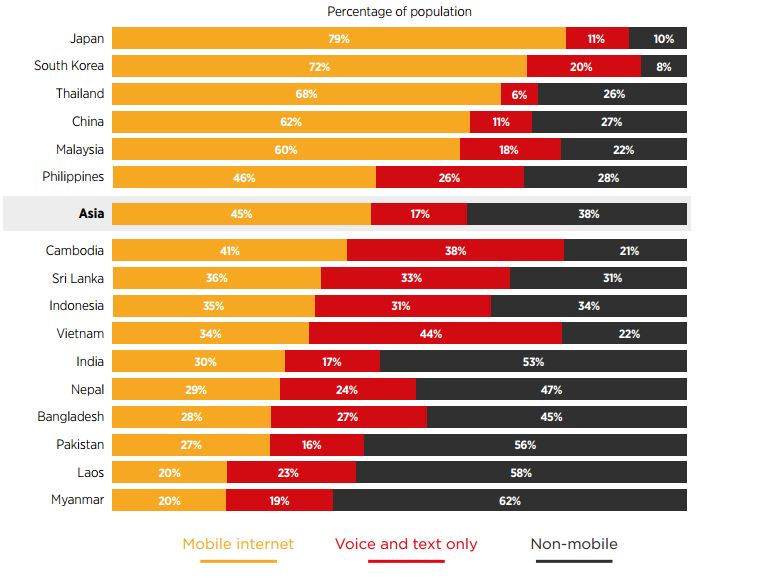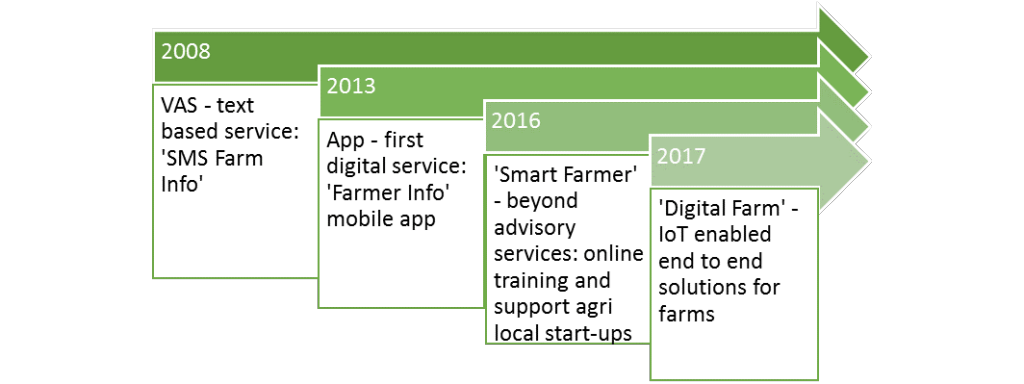This autumn, our mAgri programme hosted its bi-annual grantee workshop in Thailand, gathering our mAgri Challenge Fund Mobile Network Operators (MNOs). We spent a full day with dtac, Telenor’s subsidiary and second-placed operator in the market, learning how they are looking at the mobile agriculture opportunity in a market with high mobile internet penetration even in rural areas.
Thailand’s market context: powerful mobile growth and opportunities in the agricultural sector
Thailand represents an impressive case of mobile connectivity in South East Asia with mobile internet subscriptions higher than the regional average hedging similar rates than developed markets (figure 1). Smartphone adoption is reflective of this growth representing over 60 per cent of the total mobile connections. In 2014, the government of Thailand launched the ‘Digital Economy Plan’, a strategy striving for a digitally inclusive society and economy. GSMA reported mobile broadband would be a critical enabler to this plan as this infrastructure would generate new skilled jobs and strengthen digital inclusion central to the government’s vision.

Figure 1 – Asia: mobile internet, voice & text and non-mobile subscribers (Source – ‘Consumer Barriers to Mobile Internet Adoption in Asia’, 2015)
Whilst mobile growth in Thailand mirrors trends of developed markets, the country shares similar agricultural challenges faced by developing countries. A large share of the Thai population has linkages to the agriculture sector with an estimated seven million households depending on farming activity for their livelihoods. As a top ranked global rice exporter and with just over 10 per cent (World bank data, 2014) of Thailand’s economic activity relying on agricultural production, there is a significant opportunity to further develop the sector and its overall contribution to the economy. It is with this goal in mind that dtac decided to play a key role in Thai farmers’ development.
dtac’s evolution: An example of continuous innovation in agriculture
In an effort to improve the access to knowledge and know-how on new farming techniques, dtac launched in 2008 its first mobile agricultural advisory service. The ‘SMS Farmer Info’ provides daily updates on weather forecasts, farming techniques and market prices and offers a direct line to a call centre. In 2013, seeing an uptake of internet adoption amongst rural, the MNO launched an app version of the SMS service dubbed ‘Farmer Info’. The app, in addition to the information offered by the value added service, features agricultural knowledge and farming tips in the form of video clips. As a next feature, dtac is working on the integration of a marketplace connecting farmers to buyers. The MNO partners with SamnuekRak Ban Kerd Foundation, which developed the app and provides the content for both services. Currently, both services are offered for free on dtac’s network and have been tracking 200,000 users (SMS service) and 100,000 users (app).
Following the Farmer Info services, in 2016 dtac implemented the ‘Smart Farmer’ programme a broader initiative to support the overall agricultural ecosystem. The long term vision of the programme is to create and develop a network of young agriculturalists aged between 17-45 across the country who use technology to improve their productivity and income. Ultimately, dtac seeks to align with the government’s vision to develop a digitally driven economy in the agricultural sector.
Below, we highlight dtac’s most recent initiatives:
1. ‘Mobile learning unit’, or the ‘Smart farming curriculum’:
Conscious of the challenge of digital literacy for rural users, dtac set up the ‘Internet volunteer’ project where employees have the option to dedicate time to farmer communities’ teaching them about the usage of a smartphone and the benefits of getting online. Within its first year, the initiative received great feedback leading to the involvement of the Ministry of Agriculture with whom the MNO has now partnered to achieve the ‘Smart Farmer’ vision. dtac in collaboration with agricultural government agencies across the country work hand in hand to host training, educating farmers on how to access knowledge and information via Mobile Internet. The curriculum has been drafted to teach farmers on the importance of using of media (e.g photo and video) in the packaging of their produce and their ‘sales’ pitch. To date, the training has been delivered to 41 provinces with an overall attendance of 3,000 farmers.
2. dtac’s accelerator programme supporting local start-ups working in agriculture
Created in 2013, dtac’s accelerator programme seeks to support local start-ups by providing early stage companies with seed funding, work space and mentoring for a period of four months. The programme hosts start-ups from varied verticals such as fintech, transport, tourism, real estate and more recently, agriculture. For example, the incubator is now supporting Freshket, a platform seeking to connect restaurants and suppliers of fresh produce in one integrated marketplace. Currently in beta mode, dtac has plans to link its network of ‘Smart Farmers’ to become suppliers within this marketplace.
3. IoT solutions for agriculture
Looking forward into 2017, dtac has partnered with NECTEC, Thailand’s National Electronics and Computer Technology Center, to develop an IoT solution for agriculture. The device, a sensor based and solar powered product with the capability to monitor seven parameters (light, humidity, temperature, water, wind and pH level), is linked to a router with dtac’s SIM card relaying the information to the cloud. This solution will eventually enable the system to send targeted advisory information to farmers’ based on farm-level granular data. Overall, dtac hopes to help smallholder farmers’ benefit from productivity gains by making the farming process more time efficient. For example, the solution would help monitor and automatically adjust temperature in a storing room depending on the crop’s specificity. By end of 2016, twenty devices will be installed and trialled by farmers across the country. dtac aims to commercially launch the devices by mid- 2017.

Figure 2- Evolution of dtac’s mobile agriculture initiatives
Key Takeaways for MNOs
From this experience, three main key takeaways emerged:
- Farmer segmentation: though it is important to address the needs of rural, famers cannot be defined as a single monolithic segment. In fact, it is critical to identify segments within farming communities when developing a product’s value proposition. dtac has opted to focus its efforts on young agriculturalists (as opposed to the traditional segment, more resistant to technology), who are already adopting more modern farming techniques and perceive the internet as a source of knowledge and direct access to buyers/consumers. To identify the targeted segment, dtac worked in partnership with the Department of Agriculture Extension, which had already carried out field research on farmers’ segmentation.
- Engagement with government: mAgri deployments benefit from close linkages between MNOs and the government. In Thailand, dtac and the government are working together to achieve the national goal of improving agriculture’s value added in the economy through mobile. While dtac leverages its mobile platform and reach, the government opens the doors to a network of farming communities and R&D facilities to test out new innovative solutions, giving dtac the leeway to pilot and iterate products before bringing them to market.
- Long term vision: To make a truly lasting impact on the lives of farmers, dtac has focused on how it can add value by leveraging mobile technology beyond advisory services testing new use cases for IoT and marketplace services. The case of dtac in Thailand shows that as Mobile Internet penetration grows, MNOs have a whole range of assets to extend their value proposition beyond basic voice and text information services.
Are you a MNO/service provider evolving your VAS into apps and IoT services in agriculture?
Tell us about your experience by contacting us at [email protected]

Visit to a mushroom farm – part of dtac’s Smart Farmer network

